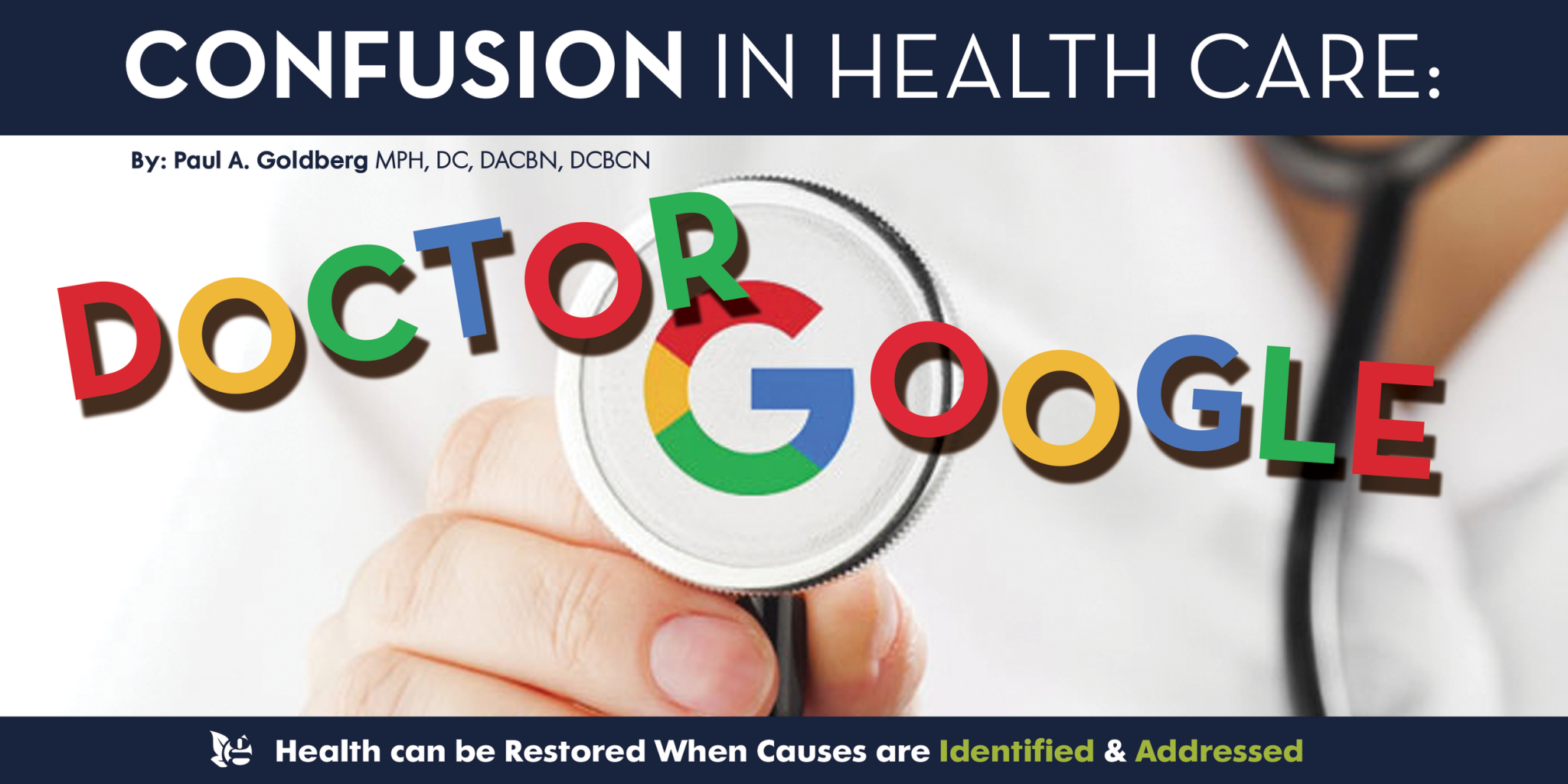17 Jan Confusion in Health Care: “Dr. Google”

Paul A. Goldberg, BA,BS,MPH,DC,DACBN,DCBCN
The Goldberg Tener Clinic
Chronic Disease Reversal since 1976
More “health information” than ever before is available to the public due to the Internet. Opinions of all kinds, often presented as fact, can be yours at the press of a few keys. Dr. Google is open twenty-four hours per day with more versions of “the truth” than you can shake an I-pad at.
More “information,” however, has not advanced the average person’s health. What the thousands of websites and “authorities” speaking through them have done, is increase the level of confusion most chronically ill people feel. Looking for answers, the health seeker finds so much contradictory information that they end up with a splitting headache. This one says that and that one says this and there is little they agree upon other than they all disagree with each other. Everyone on the internet presents themselves as authorities due to their degrees, their experiences or their “research.” Others say my condition is hopeless and I should just stick with my medical physician and continue to be drugged even though that has only gotten me worse.”
The Internet has changed how patients seek solutions to their chronic health issues but not necessarily for the better. Offering massive quantities of diverse and divisive “information,” the Internet can lead the individual into a deep abyss. Dr. Google can become a most stressful experience leading to frustration and despair.
Many doors open and then smack you in the face as they close once you enter Google World. The Internet is akin to walking through a minefield… be cautious where you step for Dr. Google sails in every direction the winds of the keyboard carry you. It is an impersonal journey where no one knows who you are or what makes you up (except interlopers/scammers). It is a warehouse of salesmanship, entertainment, scams, pornography, beauty and ugliness with bits of the angelic and demonic scattered about. It has the potential for good and the potential to generate blinding confusion and harm.
There are many reasons websites exist dealing with health and disease issues. Some are academic, some promote products, some (like ours) primarily give information about a clinic or service and others supposedly address a specific “disease”. Fact is, however, that all health websites, even those with prestigious sounding names to them that are funded from Medical Organizations or Government Agencies, have an agenda and represent a limited viewpoint. That does not mean they are dishonest (although some are) or contain fallacious information (although some do) but that they intend to convince you of a particular point of view.
To figure out if a headache or a stomach twinge is something they need be concerned with or if their doctors “diagnosis” is really a death sentence, millions of people each week head to a search engine first, often “ Dr. Google.” More than a third of all American adults have gone online to find a diagnosis, according to a 2013 Pew survey (http://www.pewinternet.org/2013/01/15/health-online-2013/).
The name of a disease, however, only represents, at most, the signs and or symptoms that person has experienced, not the actual causal factors. It has been my long experience, for example, that if we see one hundred patients who have been labeled with Rheumatoid Arthritis or Ulcerative Colitis, Lupus, or other “disease” title, there will be one hundred different reasons among them as to reason(s) each one developed those particular symptoms. The name of a disease entity is not the same as the reasons the person is ill. Therefore, for a web article of any kind to list the prognosis for any so called condition is to create the potential for confusion and even worse, create a self defeating, self fulfilling, negative prophecy. Furthermore, when a site describes a set of negative outcomes that arise calculated on those having had a particular chronic “disease,” this is invariably based on those whom have had drug treatments for that “disease.” Drug treatments for chronic diseases by their nature assure a virtually certain negative outcome since the name “chronic disease” implies that the patient under medical care has no chance of ever enjoying good health again. Note, however, that this is by definition, under medical care. The Internet user, however, assumes this simply means they are now doomed.
Looking for a diagnosis from Dr. Google often unnecessarily increases a person’s anxieties. There is even a word to describe what happens when the person searching the net for medical information becomes ill from it or addicted to continuing to probe and probe…cyberchondria.
Confusion creates anxiety and anxiety decreases the opportunity for recovery. The Internet is a wondrous place but it has its limitations and potential hazards for the health seeker, particularly for the troubled individual, as we all are, when facing serious illness and desperately looking for answers.
Related Articles by the Goldberg Tener Clinic
- Tackling Inflammatory Bowel Disease Part I
- Tackling Inflammatory Bowel Disease Part II
- Reversing Rheumatoid Arthritis
- Bacterial Overgrowth of the Small Intestine (SIBO)
- Eosinophilic Esophagitis, Gastritis and Colitis
- Problems with Ant-Acids
- A Radio Interview with Dr. Goldberg: Irritable Bowel Syndrome and Inflammatory Bowel Disease
- Serious Considerations Regarding Colonoscopy
- The Facade of Functional Medicine
Chronic Disease Reversal Case Studies





Sorry, the comment form is closed at this time.